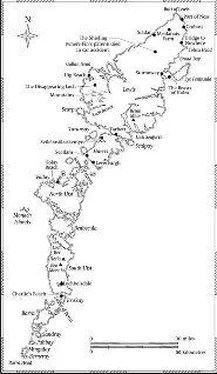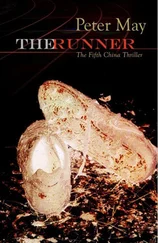Peter May - The Chessmen
Здесь есть возможность читать онлайн «Peter May - The Chessmen» весь текст электронной книги совершенно бесплатно (целиком полную версию без сокращений). В некоторых случаях можно слушать аудио, скачать через торрент в формате fb2 и присутствует краткое содержание. Жанр: Триллер, на английском языке. Описание произведения, (предисловие) а так же отзывы посетителей доступны на портале библиотеки ЛибКат.
- Название:The Chessmen
- Автор:
- Жанр:
- Год:неизвестен
- ISBN:нет данных
- Рейтинг книги:4 / 5. Голосов: 1
-
Избранное:Добавить в избранное
- Отзывы:
-
Ваша оценка:
- 80
- 1
- 2
- 3
- 4
- 5
The Chessmen: краткое содержание, описание и аннотация
Предлагаем к чтению аннотацию, описание, краткое содержание или предисловие (зависит от того, что написал сам автор книги «The Chessmen»). Если вы не нашли необходимую информацию о книге — напишите в комментариях, мы постараемся отыскать её.
The Chessmen — читать онлайн бесплатно полную книгу (весь текст) целиком
Ниже представлен текст книги, разбитый по страницам. Система сохранения места последней прочитанной страницы, позволяет с удобством читать онлайн бесплатно книгу «The Chessmen», без необходимости каждый раз заново искать на чём Вы остановились. Поставьте закладку, и сможете в любой момент перейти на страницу, на которой закончили чтение.
Интервал:
Закладка:
I can laugh now, but that’s what Stornoway felt like then. It was the only town on the island, with all its shops and cafes and restaurants, and its inner and outer harbour. It was home to the Hebridean fishing fleet and a population of eleven thousand. Sadly, there was no cinema in those days, since the Church had forced the Playhouse to close down following a showing of Jesus Christ, Superstar . At least, that was what they said, but it was before my time, so I don’t know if it’s true. The old cinema became the Royal British Legion Club, and still is.
The Church dominated life then, and in many ways still does. In all its various incarnations. But it was the presbyterian Church of Scotland and the breakaway Free Church that prevailed. They wouldn’t allow flights or ferries on the Sabbath when I was a boy, and there was not a single shop, cafe, newsagent or chippie open. You read your Sunday newspapers on Monday, and if you forgot to buy your cigarettes on a Saturday you would have an even more miserable Sunday than usual.
But that particular year, there was something special about the kids from Uig. They arrived with their own band. Six kids who’d been playing music together since primary school. Solas, they called themselves, the Gaelic equivalent of solace or comfort , and they had already developed their own unique mix of traditional Celtic music and rock. An eclectic fusion that in a few years would make them the most commercially successful Celtic rock band of their generation.
I wasn’t really aware of them at first. I was too busy adapting to life away from home in the student lodgings at the Gibson Hostel in Ripley Place. We came down from Ness in a bus on the Monday morning, and back again on the Friday night. Not that I missed my life at Crobost. My folks had been dead for years by then, and existence with my aunt was spartan. My friend Artair had gone to the Lews Castle College because his grades hadn’t been good enough to get him into the Nicolson. They wouldn’t do that to kids these days in case it gave them low self-esteem. But it wasn’t a consideration back then. Relations with my primary school sweetheart, Marsaili Macdonald, were in temporary abeyance. So in those first few months I was busy trying to forget her and make myself new friends.
The first time I came across Solas was when it was announced there was to be a ceilidh at the school. I’d heard that a group of kids from Uig was going to be playing at it and someone said they were rehearsing in one of the annexes, so I went along to see if it would be worth going to the ceilidh or not. It was a decision that changed the course of my life.
There were six in the band.
Roddy Mackenzie was the keyboard player and leader. What he said went. He had a synthesizer. A Yamaha DX-9. And I’d never heard anything like it. Strings, brass, grand piano, human voices. It could make any sound at all, apparently, and convince you it was the real thing. He was a good-looking boy, Roddy. A little under six foot, with a shock of blonde curls that tumbled around his head and a smile that, annoyingly, could charm you even when you didn’t want to be charmed.
The drummer, Murdo ‘Skins’ Mackinnon, had a high-hat and a snare drum when he arrived at the Nicolson. He used a packing case for a bass drum and biscuit tins for tomtoms. By the time he left he had a full Ludwig kit.
The guitarist, Uilleam Campbell, was a short, intense boy that everyone called Strings. Most people on the island had a nickname, because so many of the Christian names and surnames were the same. If you had sent a postcard from Australia to Strings, Isle of Lewis, Scotland , it would have reached him, no problem.
Iain MacCuish was the bass player. They called him Rambo, because anyone less like Sylvester Stallone would be hard to imagine.
And then there was Whistler. So-called because he played the Celtic flute as if he’d been born with it at his lips. Pure, haunting liquid music it was that poured from that flute of his. Sounds that swooped and soared with a flick of his finger, or a curl of his mouth. Strange somehow, coming from such a big brute of a boy whose temper and black moods would become so familiar to me. A boy so clever that while I spent untold hours studying for end-of-term exams, Whistler was off trapping rabbits, or pulling trout from the Red River, and still got the best grades in the school. I didn’t know what autistic was in those days. But if you were to ask me now, I’d say that’s what Whistler Macaskill was. Or something close to it.
And then there was Mairead Morrison, who played the fiddle and sang. She had the voice of an angel, a body that would arouse any teenage boy’s passion, and a smile that would break your heart. Long dark hair falling around square shoulders, and startling Celtic blue eyes. I fell in love with her the first moment I saw her. Me and every other boy in the school.
I was standing in the annexe as the band started to pack up at the end of their rehearsal, drooling like an idiot as Mairead put away her violin, and didn’t realize at first that the voice shouting ‘Hey!’ was being directed at me. It was a big, ginger-haired boy with a livid two-inch scar on his left cheek. He stood at the far side of the classroom. I looked at him. ‘What’s your name?’ he said.
‘Fin. Fin Macleod.’
‘Where are you from, Fin?’
‘Crobost.’
‘Aw hell, another Niseach!’ It was the Gaelic name for someone from the district of Ness, which was in the far north-west corner of the island where I lived. It drew a laugh from the members of the band. I saw Mairead looking at me and blushed. ‘Well, I suppose you’ll have to do,’ carrot-top said. ‘I’m Kenny John, but everyone calls me Kenny Mor.’ Which was Big Kenny. ‘I’ll need a hand to shift all this stuff over to the hall.’
‘What do you need a hand for? You’ve always managed before.’ Whistler was addressing himself to Kenny, but glaring at me.
‘There’s the new PA, Whistler, and Roddy’s stack. I can’t handle that on my own.’
‘Crap! We’ve got enough hangers-on as it is!’ Whistler stomped out of the classroom.
Kenny grinned. ‘Ignore him. He’s just pissed off because he saw you ogling Mairead.’
I blushed again, this time to the roots of my hair, and saw Mairead grinning in my direction. I had no idea then how Whistler’s obsession with Mairead would shape his future. Kenny chucked me a cardboard box. ‘Cables go in there. All neatly wound and tied off.’
I crossed the classroom and lowered my voice. ‘Are Whistler and Mairead. . you know. .?’
Kenny laughed. ‘He wishes.’ And under his breath, ‘Like the rest of us.’ He glanced towards the keyboard player. ‘She’s Roddy’s property.’ Then he looked at me again. ‘Are you going to give me a hand or not?’
I nodded.
Which is how I came to be a gear humpher for Solas for the rest of my time at the Nicolson.
It is also how I came to be a member of the motorcycle group. I would say ‘gang’, but that has connotations which wouldn’t be right. We were just a group of kids who wanted motor-driven wheels beneath us as soon as we turned sixteen. Roddy was the first, which was not surprising, since his parents were better off than anyone else’s. He got a bright red shiny moped, and used to ride around town with Mairead sitting on the luggage rack at the back, her arms around him, and we all imagined what it must feel like to have her pressing herself up against you like that. I’m not sure how legal it was — having a passenger on the back, I mean — but the cops never stopped them.
I suppose that’s what started the ambition in most of us. And one by one, those of us who could afford it got ourselves little 50cc mopeds, which in reality were not much more than motorized bicycles. The only money I had was whatever I earned humphing gear for Solas. By fifth year they were playing at dances and ceilidhs and pubs all over Lewis, and even down in Harris, and I was sharing a little in their success. But by the time I was able to afford a clapped-out old moped for myself, Roddy had already turned seventeen and graduated to a 125cc Vespa T5 Mk1. Classic blue. Secondhand, of course. It was only a scooter, and would have been scorned by real motorbike enthusiasts, but we thought it was solid gold.
Читать дальшеИнтервал:
Закладка:
Похожие книги на «The Chessmen»
Представляем Вашему вниманию похожие книги на «The Chessmen» списком для выбора. Мы отобрали схожую по названию и смыслу литературу в надежде предоставить читателям больше вариантов отыскать новые, интересные, ещё непрочитанные произведения.
Обсуждение, отзывы о книге «The Chessmen» и просто собственные мнения читателей. Оставьте ваши комментарии, напишите, что Вы думаете о произведении, его смысле или главных героях. Укажите что конкретно понравилось, а что нет, и почему Вы так считаете.












